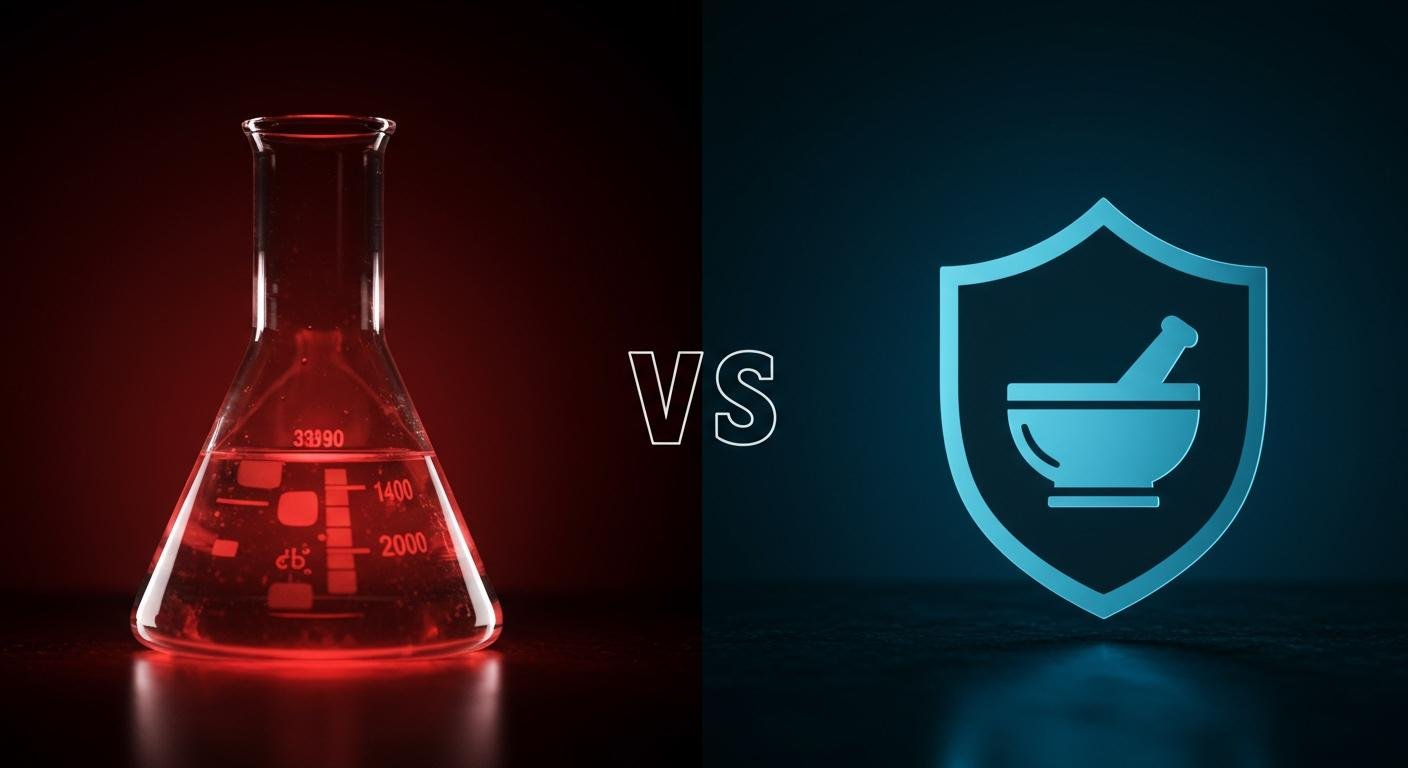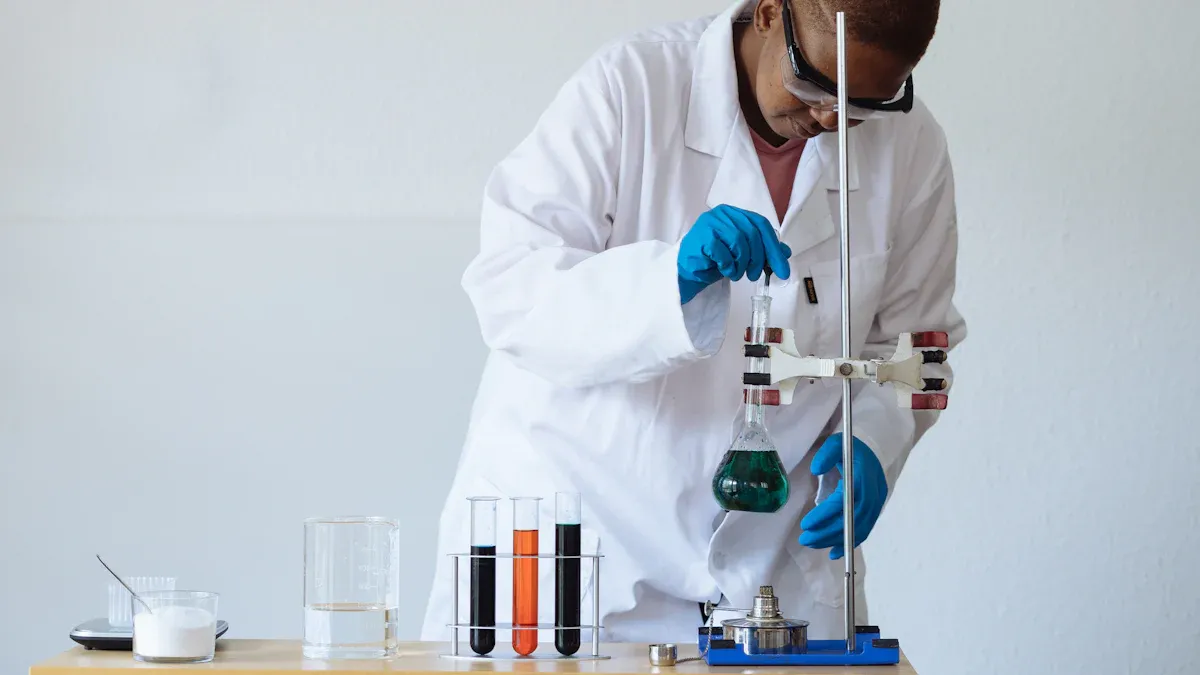NSF vs USP What’s the Difference
Table of Contents

Both NSF and USP establish excellent standards for supplement quality. They provide top-tier third-party certification, but their programs vary, a distinction particularly important for athletes. With nearly 74% of U.S. adults using a supplement, this independent oversight is critical for every consumer.
The FDA estimates that 70% of supplement manufacturers fail to adhere to basic quality-control standards. From 2007 to 2016, the agency identified 776 different adulterated supplement products sold to the public.
Third-party testing from organizations like NSF and USP verifies a supplement’s quality and purity, aligning with Common Testing Standards. A consumer can feel confident knowing that a certified supplement contains what the label claims.
OVERVIEW OF COMMON TESTING STANDARDS
Consumers often see various seals on a supplement label. These seals represent different common testing standards. Understanding these standards helps people make informed choices. Organizations provide third-party certification to increase product transparency and safety. This dietary supplement testing is voluntary for manufacturers. It shows a company’s commitment to quality.
THE ROLE OF THIRD-PARTY VERIFICATION
Third-party verification offers an unbiased review of a supplement. Independent labs confirm a product’s contents without financial interest in its sales. This process is vital. Unverified supplements can pose serious health risks. Some products contain microbial contaminants or heavy metals. Others have incorrect ingredient amounts. For example, researchers found that the active ingredient in red yeast rice supplements varied widely between brands. This lack of consistency makes safe dosing impossible.
This independent testing builds consumer trust. When a supplement has a certification seal, it signals transparency and credibility. Besides NSF and USP, other common testing standards exist for specific consumer needs.
- USDA Organic: Certifies a supplement contains at least 95% organic ingredients.
- Non-GMO Project Verified: Designates a product is free of genetically modified ingredients.
- Informed Choice: Another program that screens a supplement for banned substances.
Each standard provides a layer of assurance. This helps a consumer navigate the crowded supplement market with more confidence.
WHY GMP COMPLIANCE MATTERS
Every supplement manufacturer must follow Current Good Manufacturing Practices, or GMP. The U.S. Food and Drug Administration (FDA) enforces these rules. FDA GMP compliance is the minimum legal requirement for producing a supplement. GMP provides a framework for quality manufacturing. It ensures a facility is clean and the equipment is properly maintained. GMP also requires qualified personnel and proper documentation for every batch.
GMP standards cover the entire production process. This includes sourcing raw materials, manufacturing, packaging, and labeling. The goal of GMP is to prevent contamination, mix-ups, and errors.
Following GMP is fundamental for creating a safe supplement. However, GMP alone does not guarantee what is on the label is in the bottle. It is a set of process standards. A manufacturer can be GMP compliant but still produce a supplement that fails analytical testing. This is why third-party dietary supplement testing is so important. GMP ensures the process is right, while dietary supplement testing and its common testing standards confirm the final product is right. Strong quality programs use both GMP and independent testing for complete transparency.
UNDERSTANDING USP VERIFICATION
The United States Pharmacopeia (USP) is an independent, scientific nonprofit organization. For over 200 years, its mission has been to build trust in medicines and dietary supplements. USP achieves this by setting public scientific standards that help ensure access to safe, quality products. Experts at organizations like Consumer Reports consider USP to set the most widely accepted standards for a supplement. The USP Verified mark appears on many common products, including vitamins, minerals, and fish oil. A consumer who chooses a product with the USP seal can trust it meets strict requirements for quality.
LABEL ACCURACY GUARANTEE
The USP certification guarantees that what is on the label is in the bottle. USP confirms a supplement contains the ingredients listed in the correct amounts. The organization uses rigorous laboratory testing on product samples. This testing verifies that the supplement meets the quality and potency standards found in the official USP–NF (United States Pharmacopeia–National Formulary). This process ensures that a consumer gets exactly what they pay for with every certified supplement. USP provides a high level of confidence in the product’s identity.
CONTAMINANT SCREENING
A key part of the USP verification process is screening for harmful substances. A supplement can contain unwanted contaminants from raw materials or the manufacturing process. USP tests products to ensure they are free from unsafe levels of impurities. This protects the consumer from potential health risks.
USP screens for a wide range of contaminants, including:
- Heavy metals (like lead and mercury)
- Pesticides
- Bacteria and molds
- Other potential toxins
This thorough testing confirms the purity and safety of the supplement.
PRODUCT DISSOLUTION
A supplement is only effective if the body can absorb it. USP tests for product dissolution to ensure a tablet or capsule will break down properly in the body. This process is a good indicator of bioavailability, which is the body’s ability to absorb and use the active ingredients. If a supplement does not dissolve correctly, its nutrients may pass through the body without providing any benefit. The USP dissolution test confirms that the supplement will release its ingredients for absorption in a timely manner, making it a crucial step for product quality.
DECODING THE NSF CERTIFICATION MARK

NSF International provides another trusted, independent certification for dietary supplements. The core NSF certification is against NSF/ANSI 173. This is the only American National Standard for dietary supplements. It aims to build consumer confidence by ensuring product quality and safety. When a supplement carries the NSF mark, it shows the product meets this rigorous standard. NSF offers several program levels to verify a product’s integrity.
CONTENTS CERTIFIED GUARANTEE
The NSF “Contents Certified” seal confirms that a supplement contains exactly what the label states. NSF performs comprehensive laboratory testing on each product. This process verifies the formulation and confirms ingredients are present in the stated amounts. The testing also screens for contaminants to ensure the purity of the supplement.
NSF checks for a range of harmful substances, including:
- Heavy metals like lead and mercury
- Pesticides and herbicides
- Microbiological elements
This thorough evaluation guarantees the product’s composition and label accuracy, giving consumers peace of mind.
ANNUAL FACILITY AUDITS
An NSF certification goes beyond one-time product testing. NSF also conducts annual audits of manufacturing facilities. These audits verify that the manufacturer complies with the FDA’s Good Manufacturing Practice (GMP) requirements. This ongoing oversight ensures that every batch of a supplement is produced in a clean, safe, and well-controlled environment. The annual facility audit is a critical component of the NSF certification, demonstrating a continuous commitment to quality.
NSF CERTIFIED FOR SPORT
For competitive athletes, the NSF Certified for Sport program is the gold standard. This specialized NSF certification is a key differentiator from other programs. It verifies that a product is free from more than 280 substances banned by major athletic organizations. NSF tests every product lot for stimulants, steroids, and other prohibited agents. This program is officially recognized by organizations like the United States Anti-Doping Agency (USADA), Major League Baseball (MLB), and the National Hockey League (NHL). An athlete who uses an NSF Certified for Sport supplement can be confident it is safe for competition.
USP VS. NSF: A DIRECT COMPARISON

Choosing between a USP and NSF certified supplement can feel confusing. Both seals represent a high level of quality and safety. However, their programs have key differences in scope, testing protocols, and target audiences. A direct comparison helps clarify which third-party certification best fits a consumer’s needs.
SCOPE AND STANDARDS
Both USP and NSF are non-profit organizations dedicated to public health. They both verify that a supplement is made according to GMP and that its label is accurate. The main distinction lies in their ongoing monitoring and program structure. NSF places a strong emphasis on continuous testing and unannounced facility inspections post-certification. This ensures every batch of a supplement maintains the same quality.
The table below highlights the fundamental differences between their standards.
| Feature | USP Verification | NSF Certification |
|---|---|---|
| Certification Process | Annual facility audits and product testing. | Extensive product testing and unexpected facility inspections. |
| Post-Certification | Focuses on annual re-evaluation. | Continuous testing of every batch and regular on-site audits. |
| Non-Compliance | Works with manufacturers to correct issues. | Can lead to product recall and public notification. |
| Banned Substances | Screens for common contaminants like heavy metals. | The sport program specifically tests for 280+ athletic banned substances. |
While USP sets official standards for medicines and a supplement, the core NSF certification is against NSF/ANSI 173. This is the only American National Standard for dietary supplements.
ATHLETIC COMPLIANCE
For competitive athletes, the difference between USP and NSF is critical. The standard USP verification program ensures a supplement is pure and potent. It does not, however, specifically test for substances banned in sports. This creates a potential risk for athletes who must avoid prohibited agents. An unverified supplement can lead to serious consequences.
- South African sprinter Carina Horn received a ban after her supplement was found to contain banned substances.
- Brazilian athlete Larissa Cunha faced a suspension after testing positive for Ostarine, which she stated came from a contaminated supplement.
These cases show why specialized testing is so important. The NSF Certified for Sport program was created to solve this exact problem. This third-party certification guarantees that a product is free from substances banned by major athletic organizations. For an athlete, this seal provides an essential layer of protection and peace of mind.
PROGRAM OPTIONS
The two organizations also differ in their program offerings. USP provides one primary, comprehensive verification program for any supplement. This program involves a rigorous three-part process that includes ongoing compliance activities to maintain the high quality of the product. A consumer seeing the USP seal knows the supplement has met these stringent requirements.
NSF offers multiple certification levels. This allows manufacturers to choose the program that best suits their product and target market.
NSF provides two main options for a supplement.
- NSF Contents Certified: This certification is similar to the USP program. It confirms label accuracy, tests for contaminants, and verifies GMP compliance.
- NSF Certified for Sport: This is the more advanced program. It includes all the checks of the Contents Certified seal plus the crucial testing for over 280 athletic banned substances.
This multi-level approach from NSF allows consumers to easily identify a supplement that meets general health standards versus one that is also safe for athletic competition. Both USP and NSF require adherence to GMP, but the program options from NSF offer more specific solutions.
WHICH SEAL IS RIGHT FOR YOU?
Deciding between a USP Verified and an NSF Certified supplement depends entirely on an individual’s needs. Both seals offer a powerful guarantee of quality. A consumer can trust that a certified product is safe and accurately labeled. The right choice becomes clear when considering personal health goals and professional requirements.
FOR THE GENERAL CONSUMER
For the average consumer, either the USP or NSF seal is an excellent indicator of a high-quality supplement. The primary goal for most people is to confirm a product’s safety and integrity. Both certifications achieve this. They verify that a supplement contains the ingredients listed on the label in the correct amounts. They also screen for harmful levels of contaminants.
A general consumer buying a supplement like fish oil gets a key benefit from certification. Choosing an NSF Contents Certified or USP Verified product provides assurance of:
- Label accuracy for active ingredients like EPA and DHA.
- The absence of harmful contaminants such as heavy metals and PCBs.
This verification gives a consumer confidence in their purchase. Many trusted brands use USP verification for their products. A shopper can find these items easily in major retail stores.
- Nature Made Glucosamine Chondroitin Complex with MSM
- Member’s Mark CoQ10 200mg Softgels
- Nature Made Advanced Multivitamin Gummies
- Nature Made Zero Sugar Vitamin C Gummies
Ultimately, any consumer looking for a reliable vitamin, mineral, or other supplement can choose a product with either seal. Both marks signify that the manufacturer has invested in independent quality verification.
FOR COMPETITIVE ATHLETES
The choice is much clearer for competitive athletes. The NSF Certified for Sport seal is the non-negotiable standard. While the USP program ensures a quality supplement, it does not include testing for substances banned in sports. This gap creates a significant risk for any athlete subject to anti-doping rules. A contaminated supplement can end a career.
The consequences of a positive test are severe and far-reaching. An athlete faces more than just a temporary setback.
- Professional Penalties: An athlete can receive a suspension ranging from a warning to a lifetime ban. They often face disqualification, loss of medals, and forfeiture of prize money.
- Financial Losses: A positive test can lead to the loss of millions of dollars in salary and the termination of valuable endorsement deals.
- Personal Fallout: The public disclosure of a violation can cause immense embarrassment and social isolation. It can tarnish an athlete’s reputation permanently and disappoint family, friends, and fans.
The NSF Certified for Sport program was designed specifically to prevent this outcome. It is the only program that tests every single product lot for over 280 banned substances. This gives an athlete the highest level of protection. To make verification easy, NSF provides a user-friendly mobile app and website. An athlete can quickly confirm a supplement’s status.
The NSF Certified for Sport app includes helpful features:
- UPC barcode scanning for instant product checks.
- Side-by-side comparison of different products.
- Search options by product name, brand, or athletic goal.
- A favorites list to save preferred products.
Using these tools, an athlete can confidently choose a supplement that is safe for competition. For this reason, the NSF Certified for Sport seal is the only appropriate choice for serious athletes.
Both USP and NSF provide invaluable trust, confirming a supplement’s quality and safety. For the general consumer, either seal on a supplement is an excellent choice. The NSF Certified for Sport seal, however, is the non-negotiable standard for any athlete needing a safe supplement.
The single most important factor for any consumer is this assurance of quality. A consumer who looks for these marks can choose their next supplement with confidence.
FAQ
### Is one certification better than the other?
Neither certification is better overall. Both USP and NSF provide excellent quality assurance for a general consumer. The NSF Certified for Sport seal, however, is the necessary choice for competitive athletes. It specifically tests for substances banned in sports, offering a higher level of protection for athletes.
### Where can I find certified products?
Consumers can find certified products at most major retailers and online. The USP and NSF websites offer searchable databases of all verified supplements. Additionally, the NSF Certified for Sport program has a mobile app that allows users to scan a product’s barcode for instant verification. 📱
### Does the FDA approve dietary supplements?
The FDA does not approve dietary supplements for safety or effectiveness before they are sold. The agency sets manufacturing standards called GMP. Third-party organizations like USP and NSF fill this gap. They provide the independent testing that confirms a product’s quality and safety for consumers.
### What does GMP stand for?
GMP stands for Good Manufacturing Practices. The FDA requires all supplement makers to follow these rules. GMP ensures a company produces its supplements in a clean and controlled environment. It covers the entire process, from sourcing materials to final packaging, to prevent errors and contamination.

Poseidon
Master of Nutritional Epidemiology, University of Copenhagen, Herbal Functional Nutrition Researcher
Focus: The scientific application of natural active ingredients such as Tongo Ali, Horny Goat Weed, and Maca to sexual health and metabolic regulation.
Core Focus:
Men: Use a combination of Tongo Ali (an energizing factor) + Maca (an energy reserve) to improve low energy and fluctuating libido.
Women: Use a combination of Horny Goat Weed (a gentle regulator) + Maca (a nutritional synergist) to alleviate low libido and hormonal imbalances.
Stressed/Middle-Aged Adults: This triple-ingredient synergy supports metabolism, physical strength, and intimacy.
Product Concept:
Based on traditional applications and modern research (e.g., Tongo Ali promotes testosterone-enhancing enzyme activity, and icariin provides gentle regulation), we preserve core active ingredients and eschew conceptual packaging—using natural ingredients to address specific needs.
Simply put: I'm a nutritionist who understands "herbal actives." I use scientifically proven ingredients like Tongo Ali, Epimedium, and Maca to help you make "sexual health" and "nutritional support" a daily routine.
